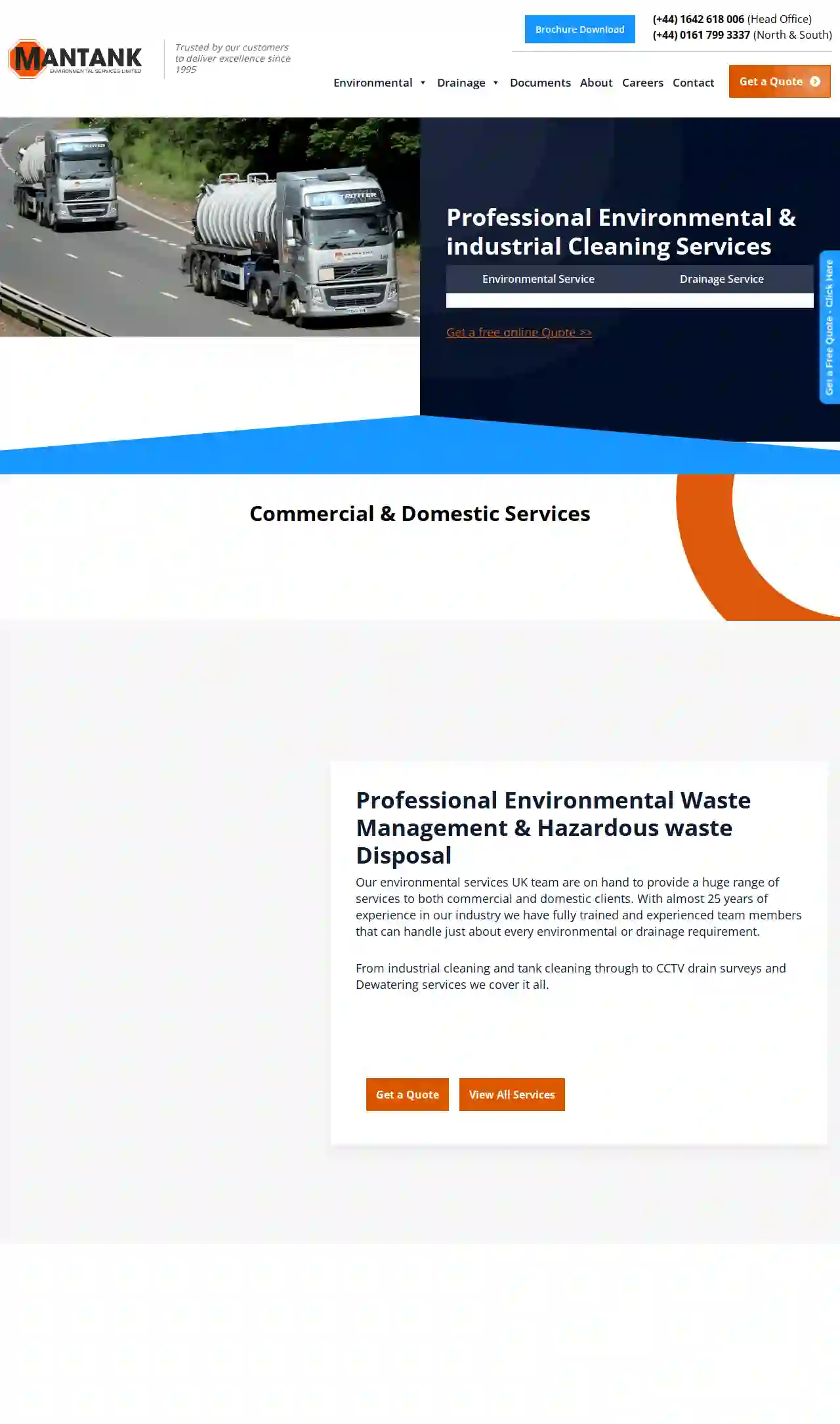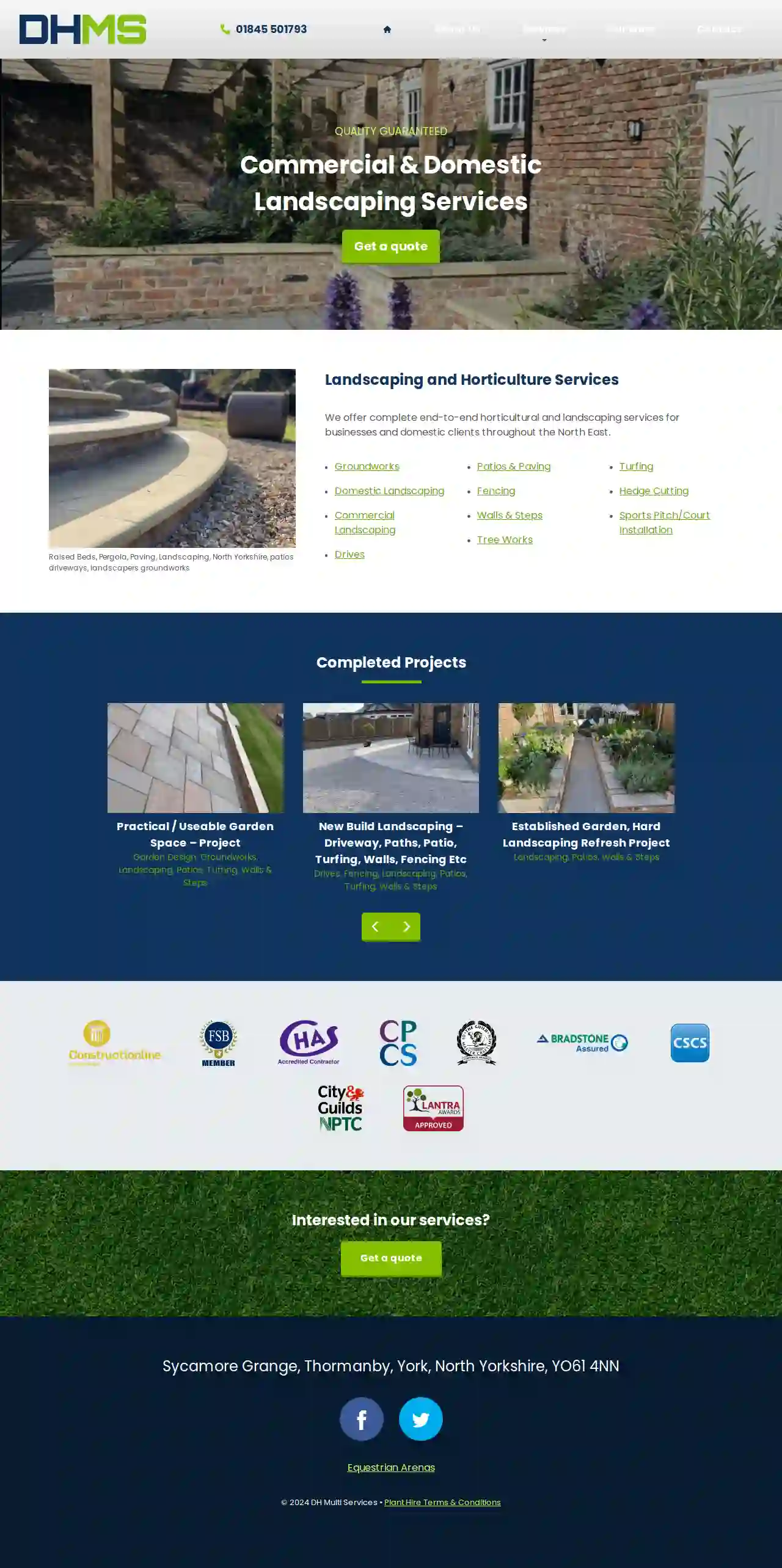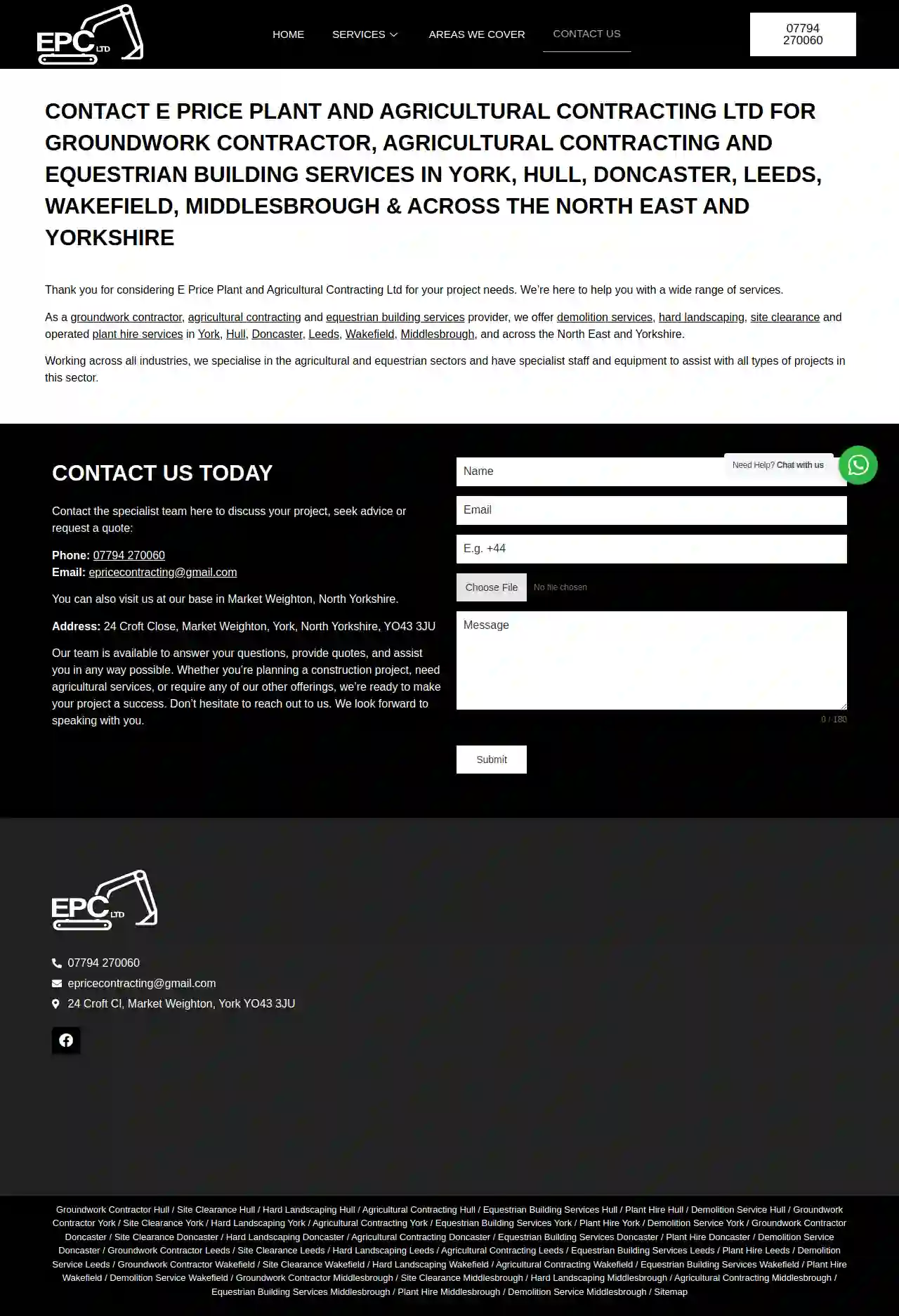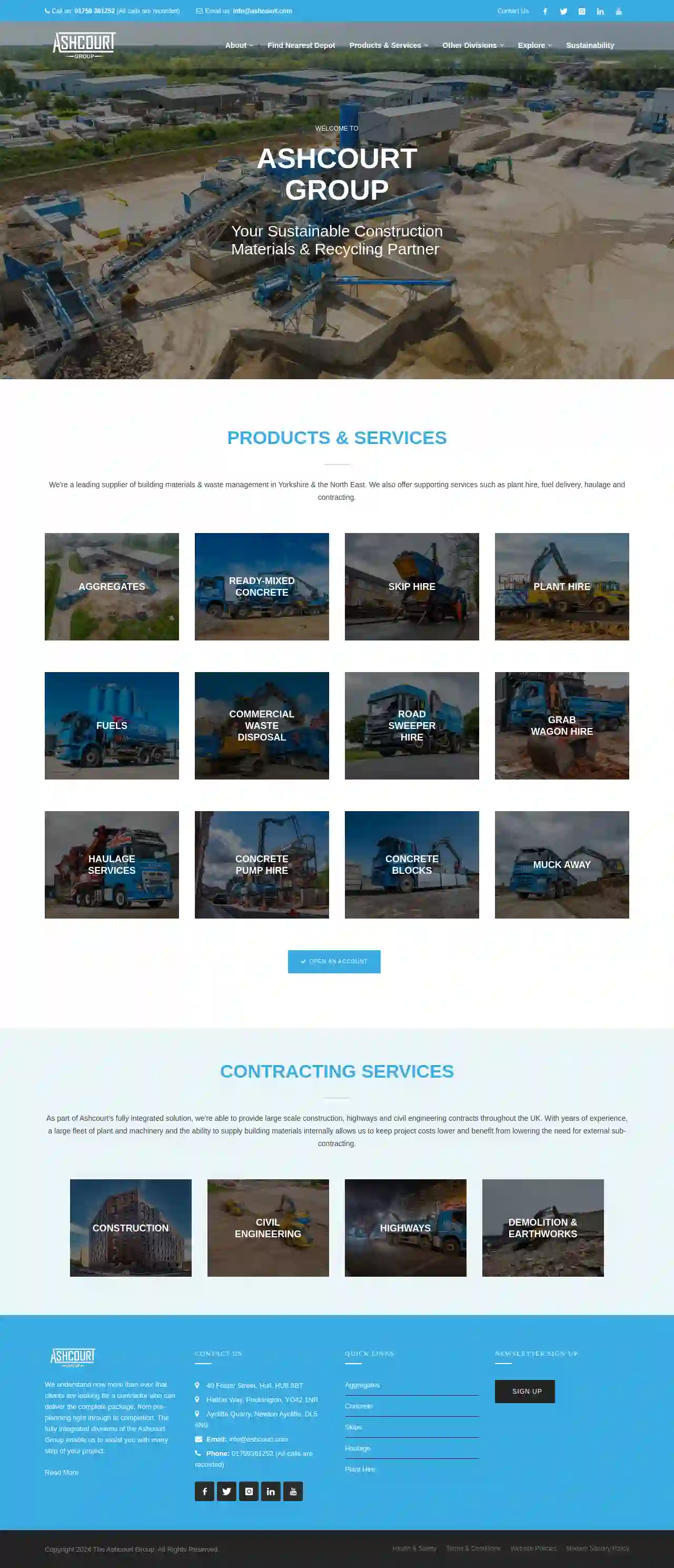Demolition Contractors Great Driffield
Best Demolition Contractor in Great Driffield
Receive multiple Demolition Contractors quotes for your project today! Compare profiles, reviews, accreditations, portfolio, etc... and choose the best offer.

Northstar Civil Engineering Ltd.
52 reviewsLauren House, Suite 137A Wakefield Road, Fenay Bridge, Huddersfield, HD5 0AN, GBWe are Northstar Civil Engineering Ltd YOUR PARTNER IN CONSTRUCTION We are a civil engineering and construction company working within Yorkshire and the surrounding areas. With the experience and expertise that Northstar Civil Engineering has to offer, we undertake most forms of Civil Engineering. We are fully accredited, trained professionals in all manner of civil engineering and groundworks projects using modern machinery and best practises, we can complete the job efficiently with the highest degree of excellence. Our genuine passion for construction along with our experience and diligence plays a huge role in our ability to complete projects on time and within budget whilst not compromising on the quality of our services. LOOKING FOR A CIVILS CONTRACTOR FOR YOUR NEXT PROJECT? Speak to our one of team today for a quotation
- Services
- Why Us?
- Gallery
Get Quote
Mantank Environmental Services Scunthorpe
3.73 reviewsHill House Farm, Redmarshall Road, Redmarshall, Stockton on Tees, Stockton-on-Tees, TS21 1EW, GBMantank Environmental Services Mantank Environmental Services is a leading provider of environmental and drainage services across the UK. We have been trusted by our customers to deliver excellence since 1995, and we are committed to providing our clients with the highest quality services at competitive prices. Our Services We offer a wide range of services to meet the needs of our clients, including: Tank Cleaning Industrial Cleaning Sewage Tank Cleaning Tank Decommissioning Chemical Waste Disposal Environmental Services UK Water Tank Cleaning Dewatering Services Waste Management Company Water Jetting Vessel Cleaning Industrial Vacuum Sludge and Silt Removal Industrial Tank Cleaning SuDS Pond Maintenance CCTV Drain Survey Drain Camera Drain Clearance Drain Inspection Drain Repair Drainage Services Our Commitment to Excellence We are committed to providing our clients with the highest quality services. We are fully accredited and insured, and we have a team of experienced and qualified professionals who are dedicated to providing our clients with the best possible service. Contact Us If you are looking for a quote or just some advice, please feel free to contact us. We are always happy to help.
- Services
- Why Us?
- Accreditations
- Gallery
Get Quote
Act Fast Waterproofing Corp.
4.964 reviewsToronto, GBAct Fast Waterproofing: Your Toronto Basement Waterproofing Experts Act Fast Waterproofing is your trusted partner for all your basement waterproofing and foundation repair needs in Toronto and the surrounding areas. We have over 25 years of experience in the industry, and our dedicated team is committed to providing you with the highest quality services and solutions. Our Mission Our mission is simple: to dry up your basement or crawlspace permanently. We understand the frustration and inconvenience that a wet basement can cause, and we are dedicated to providing you with a permanent solution. What We Offer We offer a wide range of basement waterproofing services in Toronto, including: Basement Lowering / Underpinning Control Mold Crack Injection Sealing Demolition and Excavation External Waterproofing Internal Waterproofing Masonry Services Sump Well & Pump Window Well Why Choose Act Fast Waterproofing? Here are just a few reasons why you should choose Act Fast Waterproofing: Experience: We have over 25 years of experience in the waterproofing and foundation repair business. Commitment: We are committed to solving all types of basement and crawl space water problems, as well as structural repair issues. Industry-Leading Warranty: All of our residential, multi-unit, commercial, and industrial waterproofing solutions carry a 25-year transferable warranty. Customer Satisfaction: Our clients rave about the proven superior methods that we use. Professional Team: Our employees are all highly trained and properly vetted. Get a Free Estimate Today! Don't let a wet basement ruin your home. Contact Act Fast Waterproofing today for a free estimate. We'll be happy to answer any questions you have and provide you with a customized solution.
- Services
- Why Us?
- Gallery
Get Quote
DHMS
4.611 reviewsThormanby, York, Sycamore Grange, YO61 4NN, GBAbout DH Multiservices Ltd Established over 20 years ago, DH Multiservices Ltd now has bases in Thirsk, Easingwold and Northallerton. Our highly skilled team of landscaping professionals have been serving clients throughout North Yorkshire & the North East. We pride ourselves on providing a comprehensive range of landscaping and horticultural services, catering to both commercial and domestic clients. Whether you're looking to create a stunning new garden, enhance your existing outdoor space, or require expert groundworks, we have the expertise and experience to deliver exceptional results. Our commitment to quality, attention to detail, and customer satisfaction has earned us a reputation as a trusted and reliable landscaping company in the region. We are fully insured and qualified in all aspects of horticulture, ensuring that your project is completed to the highest standards. From initial design concepts to the final touches, we work closely with our clients to understand their vision and bring it to life. Our team is dedicated to providing a friendly and professional service, ensuring that your experience with DH Multiservices Ltd is enjoyable and stress-free. We offer a range of services including: • Groundworks • Domestic Landscaping • Commercial Landscaping • Drives • Patios & Paving • Fencing • Walls & Steps • Tree Works • Turfing • Hedge Cutting • Sports Pitch/Court Installation We are committed to providing our clients with the highest quality services and exceptional customer care. Contact us today to discuss your landscaping needs and receive a free, no-obligation quote.
- Services
- Why Us?
- Testimonials
- Gallery
Get Quote
Maine Commercial Contracting
52 reviews36 Curtis Farm Road, Buxton, 04093, GBMaine Commercial Contracting At Maine Commercial Contracting, we provide a wide array of contracting services at competitive prices. We believe the best way to succeed and grow is to help you succeed and grow. Any Project Size, Any Personal Touch. We have an established tradition of delivering the finest quality craftmanship by employing and training hard working individuals with an attention to detail and an appetite for excellence. We maintain an high regard to our clients’ budgets and timelines, which shows in our positive relationships with those who contract with us. Maine Commercial Contracting is a full service excavating and grading contractor located in Southern Maine, serving the entire New England area. Your business needs to be accessible during hours of operation. In New England, this means needing reliable snow removal services any time day or night to make sure your lots are clear and your business is open and busy. Maine Commercial Contracting has installed hundreds of custom residentail asphalt driveways throughout the state of Maine and New England area. While retaining walls look like simple stacked stones, blocks, or wood, they are actually carefully engineered structures that fight against gravity and the weathering elements. At least, the ones we build here at Maine Commercial Contracting are. Our specialized equipment will have your concrete shed pad installed in no time. We build solid foundations for your structures. Our specialized equipment will have your septic area dug out in no time. We work smart and hard to make sure the job is done right as well as timely. We have big equipment for your big or small project. Hire us for your small excavation and/or demolition needs to prep your site for the next great addition in your community. We take on a wide variety of industrial, commercial, and residential projects, which means we have the tools, team, talent, and experience to make it happen on time and in budget. Want something more durable than a dirt path? Maine Commercial Contracting provides an array of flatwork services to meet any size job and budget. We build bike trails, hiking trails, patios, driveways, and more.
- Services
- Why Us?
- Testimonials
- Gallery
Get Quote
Olympus Excavating construction
51 reviews123 Main Street, Anytown, 12345, GBAbout Olympus Excavating Company Olympus Excavating Company is a family-owned and operated business with over 20 years of experience in the excavating industry. We are committed to providing our clients with high-quality services at competitive prices. Our team of experienced professionals is dedicated to delivering exceptional results on every project, no matter how big or small. We understand that excavating projects can be complex and require a high level of expertise. That's why we take a personalized approach to every job, working closely with our clients to ensure their needs are met. We are also committed to safety and environmental responsibility, using the latest equipment and techniques to minimize our impact on the environment. Whether you need site preparation, foundation excavation, utility installation, or any other excavating services, Olympus Excavating Company is the team to call. We are dedicated to providing our clients with the highest level of service and satisfaction.
- Services
- Why Us?
- Testimonials
Get Quote
E Price Plant and Agricultural Contracting Limited
24 Croft Close, Market Weighton, York, YO43 3JU, GBE Price Plant and Agricultural Contracting Ltd A family-run business with over 20 years of combined experience in the industry, we take immense pride in delivering high quality, reputable groundworks, agricultural contracting, and equestrian building services to customers in Hull, York, Doncaster, Leeds, Wakefield, Middlesbrough and the surrounding areas. Our Services We offer a wide range of services to meet the needs of domestic customers, homeowners, commercial enterprises, industrial clients, building and construction companies, main contractors and property developers across the region. Why Choose Us? Our commitment to quality workmanship, backed by a 1-year guarantee on all our services, sets us apart. With over £10 million in public and employer liability insurance, you can trust us for your projects with confidence. Our team of experts is equipped to handle projects of all scales, whether it’s small-scale groundwork or large-scale agricultural contracting. Expertise You Can Rely On For those requiring site clearances and bulk excavations, including tree shearing, our team is well-equipped to deliver efficient solutions. We’re also adept in creating equestrian arenas and stables, tailor-made to your specifications. Our groundwork services serve as the foundation for various projects, guaranteeing stability and durability. Agricultural Contracting at its Best Our agricultural contracting services extend to tractor and trailer hire with skilled drivers, covering a variety of general land work. Whether you need to enhance and maintain your land and crops, we have the expertise and equipment to get the job done right.
- Services
- Why Us?
- Gallery
Get Quote
MB Contracting
Yarmouth, 04097, GBExperience the Difference of Professional Excavation - Choose MB Contracting Unmatched Expertise and Precision for All Your Excavation Needs MB Contracting is a Local Grading Company Serving The Greater North Yarmouth, Maine Area At MB Contracting, we specialize in grading and construction site preparation, transforming raw land into functional spaces. From land clearing and demolition to significant landscape projects and erosion control, our excavating contractors are reliable and professional. We serve the greater North Yarmouth, Maine, area. Why Choose MB Contracting? Expertise Specialized knowledge and skills in precise digging, earthmoving, and site preparation. Advanced Equipment Utilization of state-of-the-art machinery for efficient and effective excavation services. Focus Adherence to strict safety measures, ensuring a secure work environment for all involved. Comprehensive Services Offering a range of services, including land clearing, demolition, and grading, for a one-stop solution to project needs.
- Services
- Why Us?
- Gallery
Get Quote
W Clifford Watts Ltd
3.85 reviewsWatts House, Carnaby Industrial Estate, Watts House Carnaby Industrial Estate Lancaster Road Carnaby, Carnaby, YO15 3QY, GBWatts Group: Your Trusted Partner for Sustainable Construction Solutions in Yorkshire Watts Group is a leading supplier of sustainable materials and solutions in Yorkshire, serving the construction, agricultural, and equestrian industries for over 80 years. We are committed to providing high-quality products and services, including dry silo mortar, aggregates, concrete, screeds, and more. Our network of three active quarries produces washed sand and gravel, crushed limestone and chalk, walling stone, and recycled aggregates for a multitude of applications. We are proud to be a responsible and sustainable business, using recycled materials wherever possible and striving to balance the demand for raw materials with environmental protection. Our team is dedicated to providing exceptional customer service and working in partnership with our clients to achieve success. We are constantly striving to set the standard for a wide range of construction products, from readymix concrete and aggregates to mortar, concrete products, and premium agricultural products. We are committed to providing our customers with the highest quality products and services, delivered on time and within budget. We are proud to be a family-owned and operated business with a strong commitment to our community. We are committed to providing our employees with a safe and rewarding work environment and to supporting local charities and organizations. Contact us today for a free, no-obligation quotation. We are always happy to answer any questions you may have.
- Services
- Why Us?
- Gallery
Get Quote
Ashcourt Group - Hull Office
3.526 reviews40 Foster Street, Hull, HU8 8BT, GBAbout Ashcourt Group With over 20 years’ experience, Ashcourt Group has established an enviable reputation for being the partner of choice to the construction industry. We offer a seamless range of contracting services, construction materials, and logistics throughout Yorkshire, Lincolnshire and the North East. Who is Ashcourt Group? Ashcourt Group is a family-run organisation and a leading supplier of construction materials and waste management solutions. Since the group’s inception in 2012, we have expanded significantly through organic growth and a number of strategic acquisitions. We provide a fully integrated solution which ensures a streamlined service for all clients. The multi-faceted divisions of the group enable us to facilitate all requirements of construction projects, supplying products such as quarried and recycled aggregates, ready-mix concrete and a range of complimentary services such as the supply of plant hire, fuel and waste management solutions. Where does Ashcourt Group operate? To date, the company has just over 1,000 employees and operates across Yorkshire, Lincolnshire and the North East, with plans to expand nationally. We currently have several strategically located aggregate outlets, six ready-mix concrete plants, multiple wash plants and other recycling facilities, and have a fleet in excess of 220 HGVs out on the roads daily, servicing our customers across the construction industry. We work with a variety of clients including a number of blue chip companies, national construction companies, local councils and a range of agricultural, commercial and domestic customers. What sets Ashcourt Group apart? Ashcourt Group understands now more than ever that clients are looking to partner with reliable construction materials suppliers that are capable to assist with every step of a project. The fully integrated divisions of Ashcourt Group offer a streamlined service with quality and expertise at the heart of everything we do. We strive to be dynamic and innovative, constantly looking for ways to improve our services and offer our clients the best possible value for money.
- Services
- Why Us?
- Gallery
Get Quote
Over 13,059+ Excavation Pros on our platform
Our excavation pros operate in Great Driffield and beyond!
ExcavationHQ has curated and vetted the Best Excavation Companies arround Great Driffield. Find a trustworthy contractor today.
Frequently Asked Questions About Demolition Contractors
- Experience: Look for companies with a proven track record and years of experience in the demolition industry.
- Licensing and Insurance: Ensure the contractor is properly licensed to operate in your area and carries adequate insurance to protect you from liability.
- Safety Record: Inquire about their safety protocols and accident history. A reputable contractor prioritizes safety.
- References and Reviews: Ask for references from past clients and check online reviews to gauge their reputation and customer satisfaction.
- Professionalism: Choose a company that communicates clearly, provides detailed estimates, and has a courteous and responsive team.
- Permits and Regulations: Obtain all necessary demolition permits and comply with local building codes and environmental regulations.
- Contracts: Have a clear and comprehensive contract with the demolition contractor outlining the scope of work, payment terms, and liabilities.
- Environmental Laws: Comply with environmental laws regarding hazardous material removal, waste disposal, and pollution control.
- Neighboring Property Rights: Respect neighboring property rights and take measures to prevent damage or disruption to adjacent properties.
- Worker Safety: Adhere to worker safety regulations and provide a safe working environment for demolition crews.
- Waste Generation: Demolition generates a large volume of debris, contributing to landfill space and potentially releasing harmful substances into the environment if not disposed of properly.
- Air Pollution: Dust and particulate matter released during demolition can impact air quality, affecting human health and the environment.
- Noise Pollution: Demolition activities can generate significant noise, disturbing nearby residents and wildlife.
- Resource Depletion: Demolition consumes resources that could be salvaged and reused, contributing to resource depletion and environmental degradation.
How do I find a reputable demolition contractor?
Do I need a permit for demolition?
What are the legal considerations for demolition projects?
What are the environmental impacts of demolition?
How do I find a reputable demolition contractor?
- Experience: Look for companies with a proven track record and years of experience in the demolition industry.
- Licensing and Insurance: Ensure the contractor is properly licensed to operate in your area and carries adequate insurance to protect you from liability.
- Safety Record: Inquire about their safety protocols and accident history. A reputable contractor prioritizes safety.
- References and Reviews: Ask for references from past clients and check online reviews to gauge their reputation and customer satisfaction.
- Professionalism: Choose a company that communicates clearly, provides detailed estimates, and has a courteous and responsive team.
Do I need a permit for demolition?
What are the legal considerations for demolition projects?
- Permits and Regulations: Obtain all necessary demolition permits and comply with local building codes and environmental regulations.
- Contracts: Have a clear and comprehensive contract with the demolition contractor outlining the scope of work, payment terms, and liabilities.
- Environmental Laws: Comply with environmental laws regarding hazardous material removal, waste disposal, and pollution control.
- Neighboring Property Rights: Respect neighboring property rights and take measures to prevent damage or disruption to adjacent properties.
- Worker Safety: Adhere to worker safety regulations and provide a safe working environment for demolition crews.
What are the environmental impacts of demolition?
- Waste Generation: Demolition generates a large volume of debris, contributing to landfill space and potentially releasing harmful substances into the environment if not disposed of properly.
- Air Pollution: Dust and particulate matter released during demolition can impact air quality, affecting human health and the environment.
- Noise Pollution: Demolition activities can generate significant noise, disturbing nearby residents and wildlife.
- Resource Depletion: Demolition consumes resources that could be salvaged and reused, contributing to resource depletion and environmental degradation.